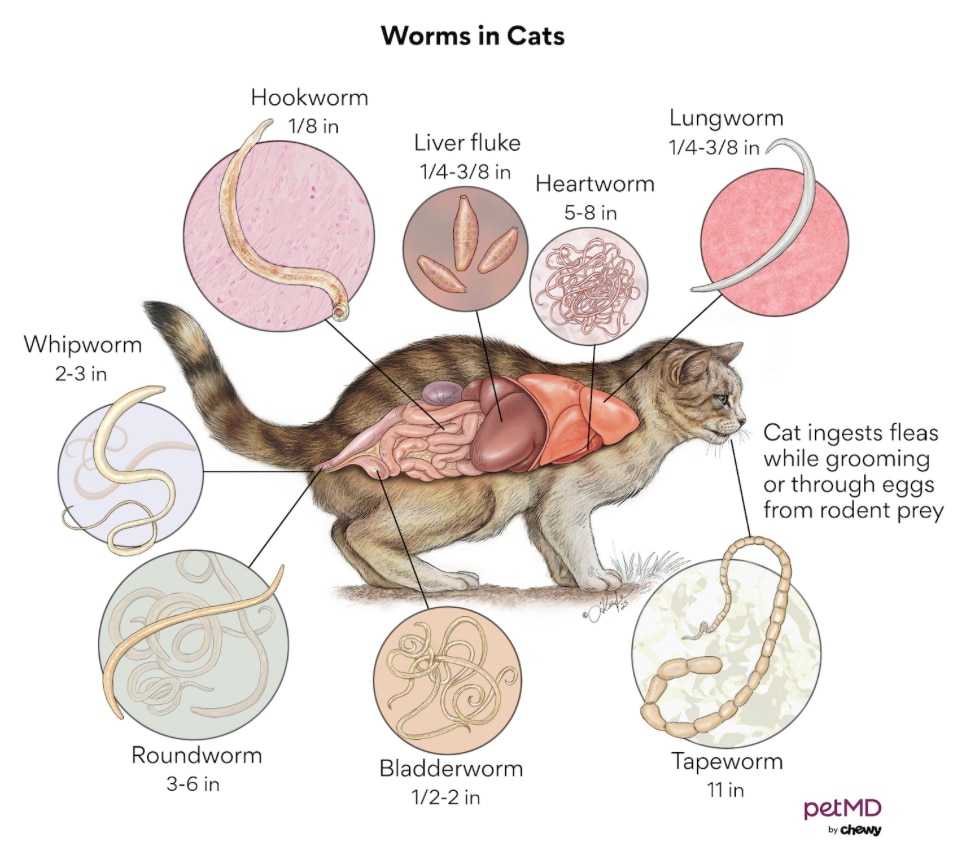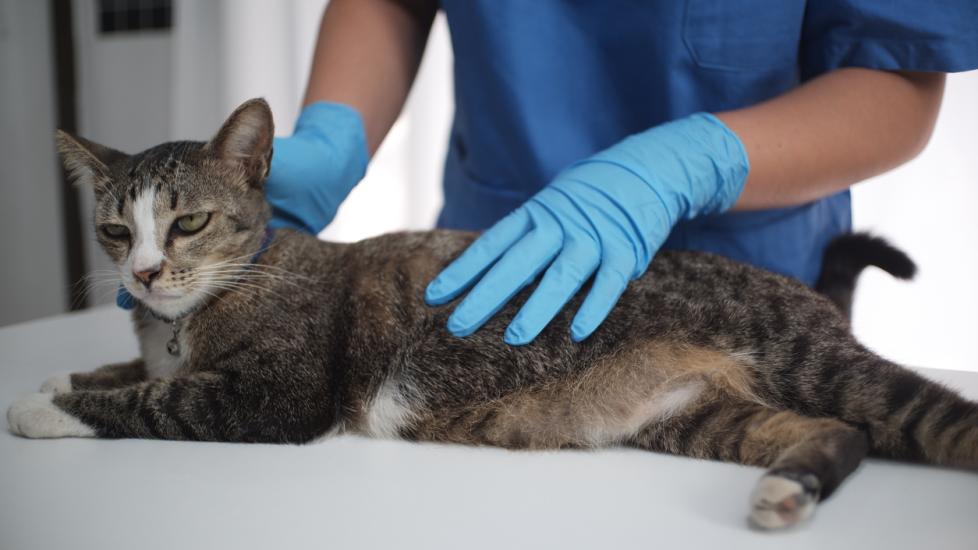Roundworms in Cats
What Are Roundworms in Cats?
Roundworms are very common parasites that thrive in the intestines of a cat. They can grow to 3-6 inches long, are cream-colored, and resemble spaghetti noodles when seen in the stool.

Click here to download this medical illustration.
Adult roundworms often swim freely in the intestines, where they produce eggs. Those eggs are shed into the stool of affected cats and can then infect other animals.
Symptoms of Roundworms in Cats
Although it is usually not life-threatening in adult cats, a roundworm infection can kill kittens and older cats. Kittens often have fewer reserves to compensate for loss from the roundworm; older cats may have other diseases that decrease their body’s ability to compensate for loss.
In kittens, symptoms include:
-
Poor growth rate
-
Diarrhea
-
Crying and vocalizing
-
Pot-bellied appearance
In adult cats, symptoms are less severe, but a large amount of worms may cause an intestinal blockage. Early symptoms include:
-
Diarrhea
-
Weight loss
-
Dull hair coat
-
Vomiting
-
Coughing
-
Pot-bellied appearance
Causes of Roundworms in Cats
An adult female roundworm produces eggs that are passed out of the body in the infected feces of a cat. Other cats become infected by ingesting roundworm eggs or by eating rodents that have ingested the eggs. Hatched eggs produce larvae that travel to the lungs, are coughed up, then are often swallowed again to finish their life cycle in the intestines. There, roundworm larvae mature into adult roundworms. Very young kittens can become infected through the milk when nursing from an infected mother.
How Veterinarians Diagnose Roundworms in Cats
Veterinarians diagnose roundworms by looking for eggs in the stool. You may be asked to bring in a sample of your cat’s stool to the vet. If your cat is small, produces little stool, or has severe diarrhea, the sample may be sent to an outside lab that uses a test with increased sensitivity to detect parasites.
Treatment of Roundworms in Cats
There are many oral and topical medications that effectively treat roundworms. To kill all the roundworm's life stages, multiple doses of medication are given on a schedule. Treatment continues until your cat has two stool tests where no parasites are seen.
Medications are given by mouth and are typically one of the following:
When roundworms are caught early and treated on a schedule, cats can recover in two to six weeks, depending on the severity of the disease. After the infection has cleared, cats can return to a normal life. It is possible to see a reinfection if your cat is again exposed to roundworm eggs or infected rodents.
Recovery and Management of Roundworms in Cats
Because cats may be reinfected, homecare management is important during treatment for roundworms and after recovery. The primary aim is to decrease exposure to infected feces, which can be done by:
-
Cleaning the litter box often
-
Limiting roaming and hunting time outside
-
Washing litter boxes regularly with pet-safe disinfectant
-
Washing your hands with soap and water after cleaning
Keep recently adopted new cats or kittens separate from other pets in the household until they are examined by a veterinarian. Submit a fecal sample for testing before a female cat is bred and before she gives birth. Administering treatment for roundworms before the kittens are born will reduce the likelihood of transmission while nursing. There are medications to treat roundworms that are safe to administer during a cat’s pregnancy and while they are nursing.
Prevention of Roundworms in Cats
The best prevention for roundworms in cats is regular deworming and limited or no exposure to the outdoors. Deworming is recommended at each kitten visit when they get their vaccines. Adult cats should get routine parasite prevention, such as a heartworm preventative that usually includes prevention for roundworms.
Pregnant cats or ones that recently gave birth should be dewormed with medication that is safe for pregnant and nursing cats. Cats that like to hunt and indoor/outdoor cats should have a stool test and deworming several times a year. Indoor cats can be exposed to roundworms from newly adopted cats, dogs in the household that go outside, or even from what we may track into the home on our shoes.
It is recommended that every year all cats have a stool test and, in some cases, are given dewormer.
Roundworms in Cats FAQs
Are roundworms contagious to other cats?
Yes. Sharing litter boxes, food, or water bowls and hunting together increases the likelihood of spreading roundworms between cats. Also, an infected mother can spread roundworms to all the kittens in a litter. If a cat in your home has roundworms, be sure to separate them from healthy pets until they have fully recovered.
Are roundworms contagious to people?
Yes. In most cases, people are infected by ingesting eggs from soil or sandboxes. They can also become infected from their household cat. Children are most susceptible, and, although rare, roundworm infections can be serious. Hand washing with soap and water after handling infected cats and litter boxes and playing outside is important to prevent an infection.
References
US Centers for Disease Control and Prevention.What Every Pet Owner Should Know About Roundworms & Hookworms.
Featured Image: iStock.com/Supitnan Pimpisarn
